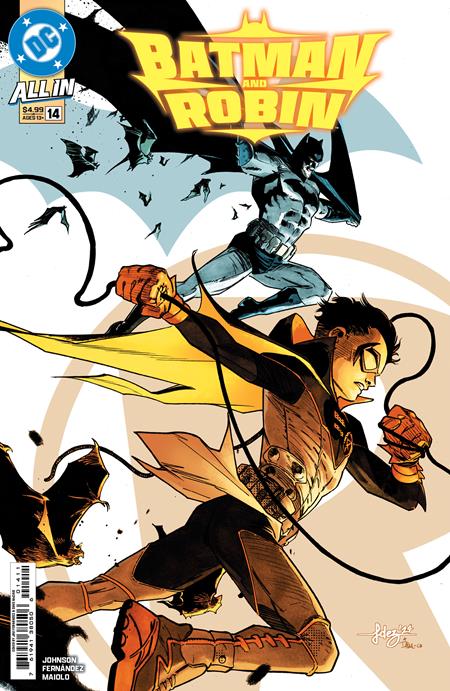In this review of Batman and Robin #14, a new era begins as Phillip Kennedy Johnson and Javier Fernández take the reigns of the series.
 Batman and Robin #14
Batman and Robin #14
Written by: Phillip Kennedy Johnson
Art and Main Cover by: Javi Fernández
Colorist: Marcelo Maiolo
Variant Covers: Simone Di Meo, Yanick Paquette, Christopher Mitten, Christian Duce, Daniel Sampere
Release Date: October 9, 2024
Synopsis (Spoilers Ahead):
It is Gotham in 1892. A man applies a death mask to a body, murmuring “Memento, mori, teacher.”
Flash forward to the present and the Dynamic Duo are in hot pursuit of three vans. Avoiding the gunfire, they apprehend a vehicle but the driver informs them the two lead cars are equipped with bombs. Robin immobilizes one of these, Batman the other, but the villains triggered the countdown. The heroes extract all of the bad guys and dispatch the vans over the side of one of Gotham’s seven bridges. Back below Gotham, Bruce is conferring with Oracle, expressing concern about Damian’s eagerness for fighting.
Bruce enters Damian’s room with a capsule dinner (“micronutrients”) and explains to Damian that their presence at a fundraiser for Sacred Heart Memorial Center that evening will help many more people than could be directly assisted by crime-fighting capers. Damian is not mollified and mopes about the Manor until encountering a chessboard in mid-game that Bruce instructs Damon never to touch (the opponent was Ra’s).
At the fundraiser, Bruce is excited to meet Dr. Malik Bashar, mentioned earlier by Oracle. A small group of protestors shout at Bruce, one of them warning, “Memento mori!” Bruce takes the stage and honors Dr. Bashar, who worked with Thomas. Damon is seated at the kids’ table and is displeased. Bruce introduces Damon to Dr. Bashar, but the latter is met with snide remarks. Bruce begins to chide him but is interrupted by Oracle’s urgent news of shots fired and Batman needed.
Bruce instructs Damian to stay put and moves swiftly to the coordinates, noting that he does not have time to put on the Batsuit. He requires complete darkness for this mission and utters a codephrase. Robin is still pouting at the kids’ table but suddenly notices the doors on his floor are barred. Wreathed in darkness, Batman drops down onto the villains and makes short work of them. He smells smoke and oil and recalls that the sub-basement of the building is noted for a terrible boiler fire in 1892.
Batman heads down and finds a conflagration in the infamous boiler room, which is completely non-operational. Suddenly, a figure looms in the shadows, who recognizes Batman and addresses him in singsong. Upstairs, Robin comms Batman insistently, repeating that the power is out and the doors are barred. Suddenly, the floor beneath Robin and the guests begins to glow and crackle. An explosion lifts Robin. “Memento mori, writ of stone!”
Analysis
And, we’re off! Thus begins the run of the new creative team Phillip Kennedy Johnson and Javi Fernández, with Marcelo Maiolo on colors. I am personally really loving Johnson’s current run on Hulk, so I’m excited to see what he will do with The Dynamic Duo.
The first issue does not disappoint. Johnson signals new beginnings literally by casting us back to 1892. Chronology is interesting in #14, as the action in “Gotham Present” certainly does not seem subsequent to the in-universe events occurring during writer Joshua Williamson’s run. In the latter, we see Damian in high school and he seems to resemble in terms of chronological age Tim Drake’s original Robin. I personally loved this older, more mature Robin and found compelling the connections between that maturation and the deeper, more positive relationship he was building with his father.
In Johnson’s telling and more notably in Fernández’s art, there is no question we have a younger Robin. He seems at most 12-13 years old – observe the panel on p. 13, in which Damian has a most childlike Calvin-esque scowl. He is miffed about having to attend the entire event, and while such behavior certainly seems developmentally appropriate for a tween, it seems decidedly young for the mature adolescent Robin that Williamson offered.
There is of course nothing wrong with telling a Batman & Robin story that occurred before the in-universe events of Williamson’s run. But if the two are somehow intended to exist in sequence inside TBU, the continuity discordance will be jarring. I much prefer the older Damian that Williamson offered, but that is subjective preference.
The plot itself moves along well and is interesting. I’m more than a bit curious about the new rogue Memento. Certainly, memento mori and vanitas art are fascinating genres in Western art and importing any of the iconography into the book offers tantalizing artistic possibilities (Mr. Fernández, if you are reading, please give us an homage to 17th c. Dutch still-lifes in these traditions, as I adore them). And the book reveals no shortage of allusions, at least to popular culture. The movement between floors and Bruce’s hunt for the villains through the building’s inner workings is an obvious and effective homage to Die Hard. Gen X and Xiennial readers, at least, will also find effective the allusion to A Nightmare on Elm Street in the boiler room standing as the beating heart for the latest evil.
All in all, this is an auspicious beginning to Johnson and Fernández’s run. The book is interesting, well-planned, and balances action and dialogue well. I cannot say I care much about Black Adam, but Johnson already shows a willingness to follow Williamson in one key aspect: Telling stories that do not overwhelm the characters of Batman and Robin!
